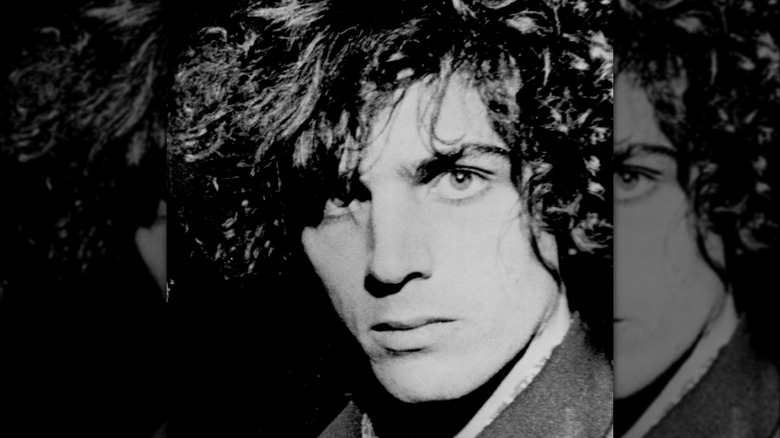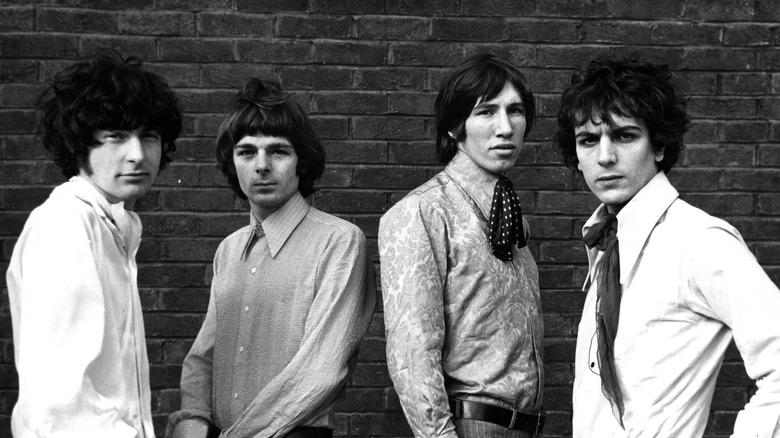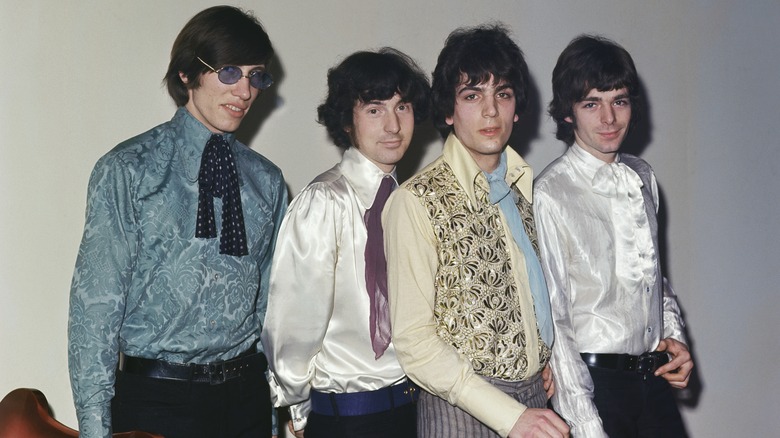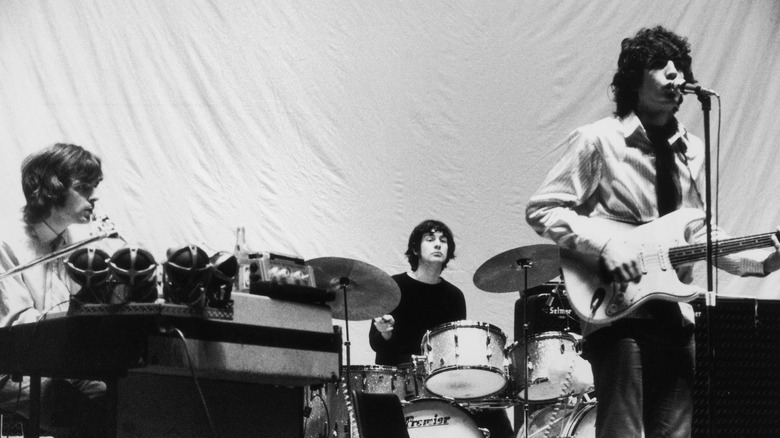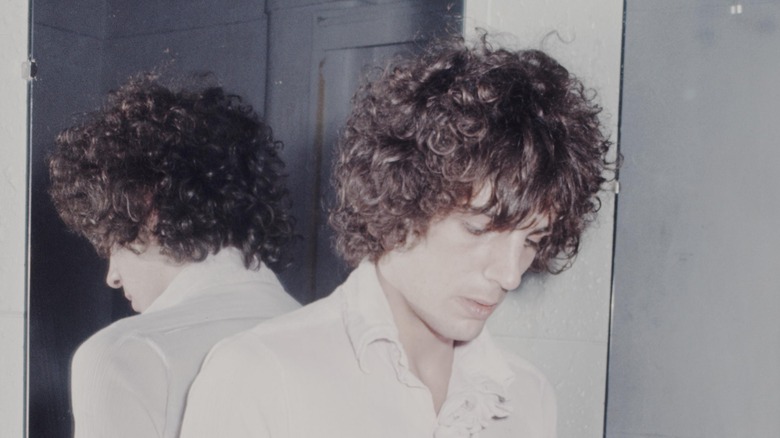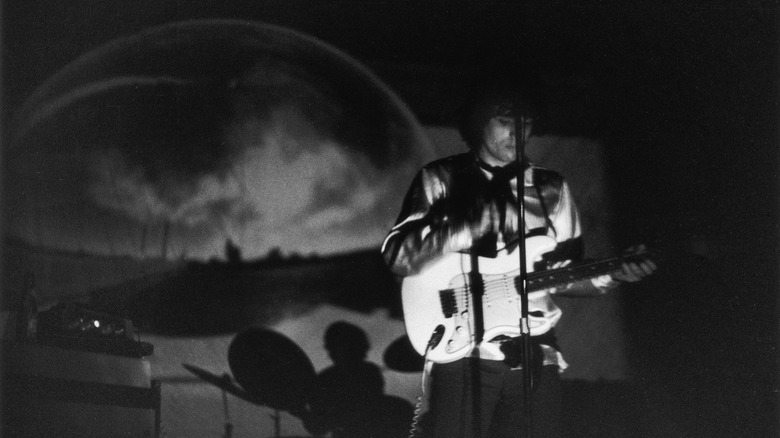What One Of Syd Barrett's Earliest Interviews Revealed About His Mental Health
As one of the founding members of British psychedelic and progressive pioneers The Pink Floyd (the "The" was later dropped), Syd Barrett is one of the undisputed greats of 1960s rock and pop music. He was also one of the first rock stars to publicly contend with mental health, bringing a conversation often kept behind closed doors out into the open. Ironically, one of his earliest interviews as a solo artist that highlighted his struggles with what was later supposed by many to be schizophrenia took place at his insistence behind a locked door.
Born Roger Keith Barrett on January 6, 1946 in Cambridge, England, per the Syd Barrett official website, Barrett received the nickname "Sid" when he was 12 due to his talent for humorous impersonations, including one of comedian Sid James. He changed the spelling to "Syd" a few years later after meeting another musician named Sid Barrett. He met future Pink Floyd band mates Roger Waters in elementary school and David Gilmour as a teenager.
Pink Floyd took London by storm
Pink Floyd formed in London in 1965 out of the ashes of Roger Waters' band Sigma 6, which featured Richard Wright and Nick Mason, per the Syd Barrett website. After two other members left, Barrett joined and renamed the band after, according to a 1967 interview with a Swedish publication, "two blues singers from Georgia, USA — Pink Anderson and Floyd Council." They played throughout London in 1966 and developed a following of fans who enjoyed their experimental sound and psychedelic image, including Barrett's famous mirrored guitar. Barrett soon became the band's primary lyricist. They signed a contract with EMI Records in 1967 and released two Barrett-penned singles, "Arnold Layne" and "See Emily Play," both of which charted in Great Britain and led to three appearances on the television show "Top of the Pops." Their album "The Piper at the Gates of Dawn" was released in August 1967; nearly every song was a Barrett composition.
It was at this time that Barrett's mental health issues, perhaps exacerbated by his interest in and copious consumption of LSD, started affecting the band negatively. Roger Waters would later note "It actually happened very fast with Syd, I have to say, right around the time of "See Emily Play." You know, he got very weird very quickly."
Syd Barrett had stage fright early on
In October 2022, Guitar reported on a recent interview with Pink Floyd bassist Roger Waters performed by podcaster Joe Rogan. Waters recounted Barrett being worried and scared before one of their appearances on "Top of the Pops" and commenting "John Lennon doesn't have to do this," which he found odd. Waters remembered telling Barrett "Buckle up, boy, let's get on with it," to no avail, explaining to Rogan "But he never did buckle up from that moment on, really. He wrote a few more songs, but nothing of any real note. And he just got more and more and more detached until he was completely wacky and not making any sense."
Biography quoted Barrett's friend, collaborator, and eventual replacement in Pink Floyd David Gilmour from Mike Watkinson's 2007 book "Syd Barrett: Crazy Diamond: The Dawn Of Pink Floyd," who recalled stopping by the studio during the recording of "See Emily Play": "Syd didn't seem to recognize me and just stared back. I got to know that look pretty well and I'll go on record as saying that was when he changed. It was a shock. He was a different person."
'Nervous exhaustion'
The sudden inability of the band's primary songwriter to actually write songs was a massive problem, obviously, and attempts to involve Syd Barrett's family as well as get him psychological help failed. Per Biography, Barrett was reported to be suffering from "nervous exhaustion," resulting in Pink Floyd missing their scheduled appearance at the National Jazz and Blues Festival. A United States tour ended prematurely after Barrett stood on stage merely de-tuning his guitar at a show at San Francisco's Fillmore West followed by an appearance on the television show "American Bandstand" during which he stared dazedly at the program's hosts.
Back in the United Kingdom, songs Barrett wrote as follow-ups to his previous hit singles were deemed too dark for release and a tour ended badly with Barrett often refusing to exit the tour bus at all or leaving the stage before the show even began. The band brought in David Gilmour and considered removing Barrett from his performing duties and keeping him on as a songwriter and behind-the-scenes member, but by March 1968, he was no longer a member of Pink Floyd.
Of aliens and crescendos: The Melody Maker interview
Per a video from the YouTube channel Yesterday's Papers, in January 1970, Syd Barrett released his solo album "The Madcap Laughs" and gave an interview to the magazine "Melody Maker" shortly after its release. Photographer Barry Wentzell later recounted his experience participating in the interview, saying "His manager came up very apologetically saying 'Syd has locked himself in a room and he won't come out. Can you speak through the keyhole and try to get him out?'" Barrett ended up letting the interviewer and photographer into the room, but quickly shut and locked the door behind them and explained that his managers were "actually aliens that were after him and he was trying to escape," Wentzell said. "Very sad."
The interview, which is also available in its entirety on the fan site The Madcap Pages, doesn't mention this but refers to Barrett as "a happy, creative — if somewhat confused young man." Barrett was often upset and went silent several times during the interview, smiling when asked about the song "Octopus." He also claimed "There's no gloom or depression for me. It's been very exciting, especially when I went to America for two weeks before the split up," and called Pink Floyd's show at Albert Hall "a crescendo" and noted he missed playing shows for people "although I haven't missed it too much recently."
A bizarre Pink Floyd reunion
According to the Syd Barrett website, he recorded his follow-up solo album, "Barrett," directly after the release of "The Madcap Laughs." David Gilmour produced the record and played bass while Richard Wright played keyboards. It was to be his last official release. He went on to put together a short-lived band, Stars, but quit after a negative review of a live performance in 1972.
He had a reunion of sorts with Pink Floyd in 1975 when he unexpectedly arrived at the recording studio at which they were working on the album "Wish You Were Here." He showed up just as the band was recording their classic song, "Shine On You Crazy Diamond," a multi-part composition written in honor of and dedicated to Barrett. Per BrainWorld, Barrett was at first unrecognizable to his former bandmates, as he had gained weight, shaved his head and eyebrows, and was acting aloof and brushing his teeth while he stood by. Roger Waters reportedly started crying upon recognizing Barrett.
Syd Barrett left the music industry and returned to his home city of Cambridge where he devoted himself to painting. He died of pancreatic cancer on July 7, 2006.
